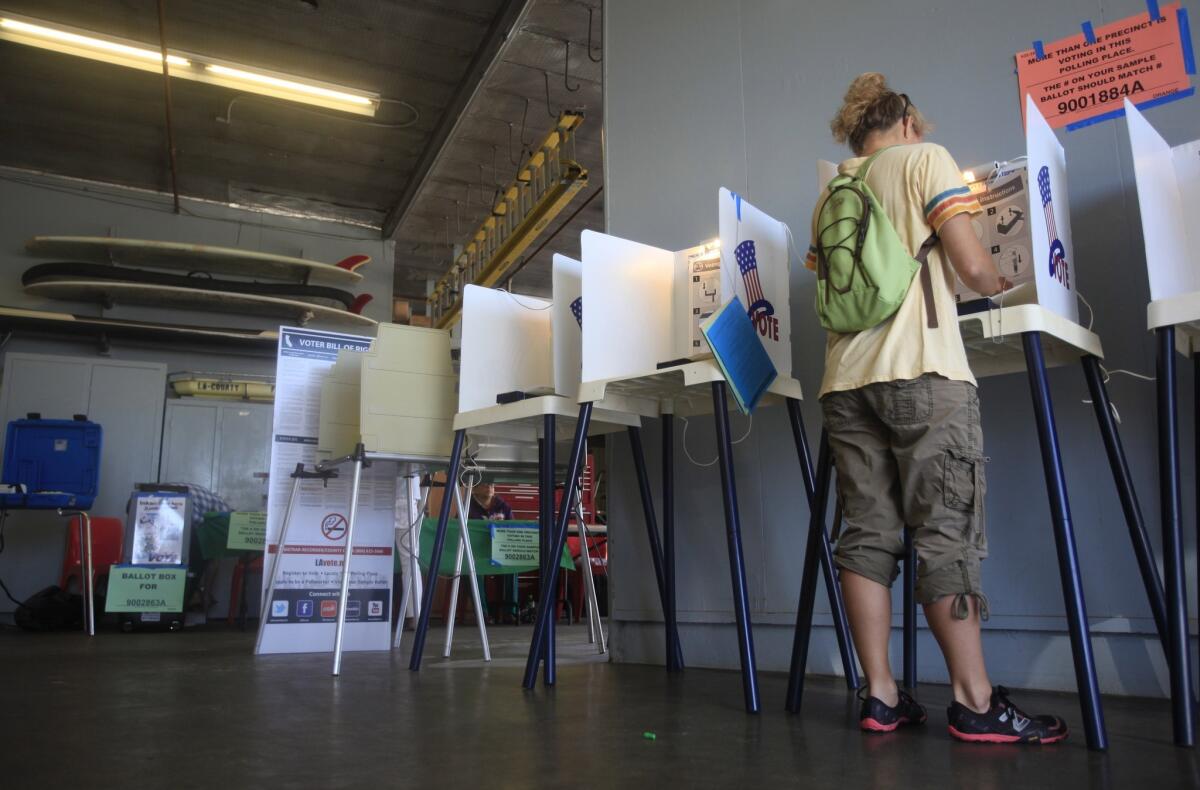Idea of an L.A. <i>Voteria </i>is<i> </i>gaining currency

- Share via
The proposal to enter L.A. voters into a cash prize lottery, for the sake of increasing turnout, is easy to attack on numerous fronts.
My first reaction to last week’s recommendation by the L.A. City Ethics Commission?
Horror.
Or maybe it wasn’t horror so much as anger that anyone would come up with such a sad little gimmick. Throughout history, people have sacrificed their lives for the right to vote, and now we have to offer jackpots to shake people out of their laziness and apathy?
“How DUMB!!!” one reader posted on the story by my colleague David Zahniser.
“Really???!!!” said another.
Aside from the problem of turning a civic duty into a commercial gambit, there’s the obvious problem of attracting voters who don’t know a councilman from a crossing guard. So I called Nathan Hochman, the ethics commission president, to hear his justification for a lottery.
“We are in a crisis,” said Hochman, citing a steep decline in turnout for local elections between 2001 and 2013, when about 75% of the city’s registered voters skipped the election won by Mayor Eric Garcetti.
“In a representative democracy, you want everybody to have a piece of ownership about their city government,” Hochman said. And when too few people take part, “the system fails.”
A commission formed by Garcetti and council President Herb Wesson had already looked at fixes, including the aligning of low-turnout local elections with higher-turnout state and national elections in even-numbered years. Another recommendation was for extended voting times, in which voters might have more places to cast ballots and several days to do so.
Those are fine ideas, Hochman said, but it’ll take years to implement them. The commission wanted to try something in the interim, on a trial basis.
He said commissioners considered the 90% turnouts in Australia, where residents are fined $20 if they don’t vote. But commissioners preferred carrots over sticks, and the idea of a prize drawing came up.
Nobody would be paid to vote. But by voting, regardless of how you vote, you might get lucky.
Hochman said roughly $65 million was spent on L.A. city elections in 2013 when you count independent expenditures and $10 million in matching funds from the city. So if you took just 1% of the $10 million in matching funds, Hochman said, or $100,000, you could probably boost engagement and turnout by randomly awarding four $25,000 prizes, or 10 $10,000 prizes, or any such combination.
Hochman began to turn me around, just a little, with that argument. If it’s acceptable to spend the obscene amount of $65 million — much of it to extort and misinform with negative attacks — why is it unacceptable to spend a tiny fraction of that amount to get more people involved?
As we all know, there are lots of reasons people don’t vote. They’re lazy, or turned off by candidates or campaigns, or they don’t believe their vote can make a difference in a city that can’t trim a tree but every half-century. Or, understandably, they don’t know the difference between the state controller and treasurer, or they can’t figure out how anyone can be expected to know one judicial candidate from another.
But regardless, is powerball politics the best way to shake up the system?
I called local government watchdog Bob Stern, who favors several reforms, and was surprised by his take on the lottery idea. It’s got pros and cons, he said, “but I like the idea of it as an experiment. Let’s try it. Clearly it would increase turnout.”
I had expected him to argue that cash prizes would invite too many know-nothings into the process, but he saw it differently.
“I agree with Hochman that people would pay more attention to it,” Stern said, “and be more educated than they are now. And that’s a good thing.”
Wesson told me Tuesday that he’s noncommittal but fascinated, pending legal review of a lottery. He said he wants to hear what neighborhood councils think, and also what non-voters have to say about why they don’t vote, and whether a lottery would make a difference.
Fernando Guerra, who directs the Loyola Marymount Center for the Study of Los Angeles and headed the election reform commission formed by Garcetti and Wesson, said there are two main reasons turnout in local elections has dropped nationally.
First, the initial fights for African American and Latino representation among elected officials have already been waged. Second, the domination of Democrats and demise of Republicans has further decreased tension and drama.
“There’s no magic wand” to address the problem, Guerra said, but he believes a lottery comes closer than anything. And he already has a name for it.
Voteria.
That’s not bad. And Guerra said that rather than use city money for prizes, which would raise political and legal issues, he’d like to see nonprofits put up the cash as an experimental investment in greater civic participation.
It’s a myth, Guerra said, that everyone who already votes is well-informed. Greater participation, he argued, will lead to more awareness of local issues and possibly undermine special-interest forces that now determine outcomes.
“The lower the turnout,” he argued, “the easier it is to manipulate and control the messages to individual voters.”
That certainly remains to be seen. But we have just witnessed a pitifully low turnout of 8% in a school board election, and Guerra predicts a paltry 15% turnout in city elections next April. That could double or triple, he suggested, if the lottery were in place and prizes evenly divided across city districts.
I still have misgivings. But I have to admit it’d be interesting to find out if he’s right.
Twitter: @LATstevelopez
More to Read
Sign up for Essential California
The most important California stories and recommendations in your inbox every morning.
You may occasionally receive promotional content from the Los Angeles Times.














